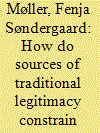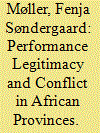| Srl | Item |
| 1 |
ID:
165197


|
|
|
|
|
| Summary/Abstract |
Research concerning authoritarian stability and peace usually investigates co-optation and repression. Recently, several studies argue that traditional legitimacy is also important for stability in monarchies. However, existing research rarely considers how legitimacy constrains rebellions and help the royal family to stay in power. Hence, this article explores the causal links between sources of traditional legitimacy and absence of uprisings. The study investigates the relationship with a case study of the Kingdom of Swaziland. In line with my expectations, I find a causal relationship between sources of traditional legitimacy and absence of popular uprisings. First, the royal family actively uses traditional legitimacy to justify their rule. Second, the Afrobarometer indicates that the Swazi people trust the King more than citizens in other African countries trust their head of state. Third, opposition actors have limited opportunities to mobilize the broader population against the monarchy. Fourth, traditional legitimacy dampens ongoing protests and thereby hinders their escalation into popular uprisings or political violence. Repression is clearly an important explanation for limited rebellion in Swaziland, but this article shows that also traditional legitimacy sources play a role
|
|
|
|
|
|
|
|
|
|
|
|
|
|
|
|
| 2 |
ID:
172823


|
|
|
|
|
| Summary/Abstract |
Several conflict studies explore material factors connected to state performance (e.g., growth and Gross Domestic Product per capita). Recently, georeferenced conflict research has linked local economic factors such as subnational wealth and intrastate inequality to conflict. However, few studies concern the people’s perceptions. More specifically, existing studies neglect the effect of performance legitimacy, understood as the people’s evaluations of presidential performance. This study argues that systematic focus on subnational variation of presidential performance legitimacy contributes to a deeper understanding of conflict occurrence. This is because objective indicators of performance such as economic wealth differ from actual perceptions of performance. The hypothesis is investigated with survey data from the Afrobarometer rounds 2–5 covering thirty-four countries and 376 first-order administrative units. These data are merged with georeferenced data from the Armed Conflict Location & Event Data (ACLED) and the Peace Research Institute Oslo-Grid dataset (PRIO-GRID). The results show that high levels of performance legitimacy in a province decrease the expected number of conflict events the following year. Future conflict studies should therefore include perceptions on a substate level.
|
|
|
|
|
|
|
|
|
|
|
|
|
|
|
|